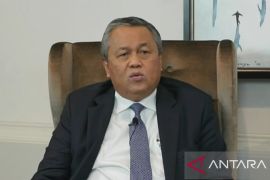Yet, the other weather phenomenon, the La Nina, took its turn in 2016 by bringing fortunes, as Indonesian agricultural production increased again, compared to 2015. This upward trend in agricultural products is expected to continue, and increase further, in 2017.
"In 2017, the agricultural subsystem and agribusiness will be better than in 2016, regardless of questions on who will be enjoying the benefits," said Bungaran Saragih, a former minister of agriculture during the administration of former president Megawati Soekarnoputri, speaking during a seminar on the outlook for agribusiness in 2017 in Jakarta on Thursday.
Over the past several months, there have been signs of a global economic revival.
According to many experts, who are also supported by Bungaran, world economic growth will increase again in 2017, though the rise has yet to reach its peak. In 2017, the world economy is expected to begin escaping the worsening economic conditions.
Next year is expected to be the starting point of the worlds economic awakening. Signs of the recovery are seen in the increase in commodity prices, including agricultural commodities. Though not yet too high, the upward trend will continue next year.
So, the prospect for agricultural products in global terms will be better and continue progressing in 2017.
The Trump Effect (the result of policies to be adopted by the US President-elect Donald Trump) will also have an impact on the Indonesian agricultural sector. Trump believes that free trade harmed the interests of the United States, as most people in the US have not been able to enjoy its benefits.
With the Trump Effect, according to Bungaran, as a nationalist, US President Donald Trump will give priority to his country. This will build new confidence, and new prospects, for business development. "Investment previously flowing out, will return to the United States again. This will have an impact on Indonesia," he said.
Bungaran, who is a professor at the Bogor-based Institute of Agriculture (IPB) in West Java, said the Trump Effect on Indonesia could be traced through the presence of pressures on the Indonesian rupiah currency.
The value of the rupiah currency against the US dollar is weakening as the US currency gains strength. While this is a disadvantage for some, it will benefit Indonesian farmers.
"This means that imports will be difficult to enter Indonesia, while exports from Indonesia will easily enter the United States. This is good for Indonesian agriculture. Imports are difficult to send to the country, since the prices of agricultural product are high and farmers will gain benefits," he said.
Moreover, Indonesia will host the Asian Games in 2018. This will also have a positive impact on the Indonesian agricultural sector. For Indonesia and Asia, the Asian Games are the largest sports event, though not as big as the Olympics Games.
What positive impact will it have? Will it have a positive impact on rice production? It will not have a significant impact on rice production, but it will on horticulture production. Athletes need high quality horticulture products.
Apart from that, consumption of meat and eggs will also increase. The same increase in consumption will also take place with milk and sugar.
The other commodity that will face healthy growth next year, according to Bungaran Saragih, is oil palm. This is because of the devaluation of the rupiah currency. The strengthening of the US dollar against the rupiah will have an impact on the higher prices of soybean and maize products.
"Palm oil will have better prospects in 2017 than in 2016, let alone if consumption at home is higher," Bungaran noted.
Therefore, he said that the conditions for Indonesian agriculture in 2017 will be better than in 2016, as a result of the improving global economy.
Moreover, imports will be discouraged, with the weakening of the rupiah.
According to President Joko Widodo (Jokowi), Indonesia is steadily reducing the import of foods, such as corn and rice. "For several years, we had imported rice. However, the agriculture minister informed me that we did not import rice in 2016," Jokowi said, at the award ceremony for Adhikarya Pangan Nusantara, held at the State Palace on November 30.
Indonesia cut the import of corn by nearly 60 percent to 3.2 million tons, the president revealed. The government has set a target of ending the import of corn by 2018.
Still, Indonesia has been exporting rice. Agriculture Minister Amran Sulaiman said the opportunity is available for Indonesia to export rice to Malaysia, especially those regions closer to Malaysia, such as Central Kalimantan.
The minister, who was on a visit to Central Kalimantan on Friday, said Malaysia imports some 1.2 million tons of rice each year.
"Indonesia should grab the market opportunity," he said, while attending the symbolic planting of hybrid rice seeds over 250 hectares of rice fields in the village of Terusan Karya, Kapuas District, in the province.
The government has set a rice production target of 79 million tons of unhusked rice this year (2016), equal to about 44 million tons of rice. Data at the Ministry of Agriculture shows that Indonesias rice consumption in 2015 only reached 33.36 million tons.(*)
Reporter: Andi Abdussalam
Editor: Heru Purwanto
Copyright © ANTARA 2016











